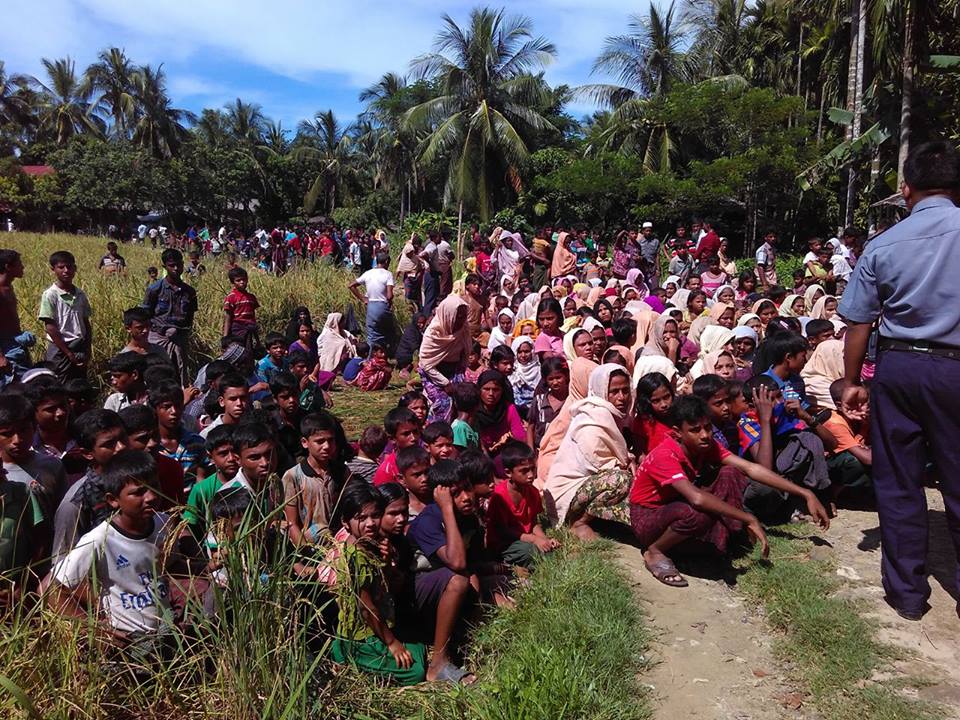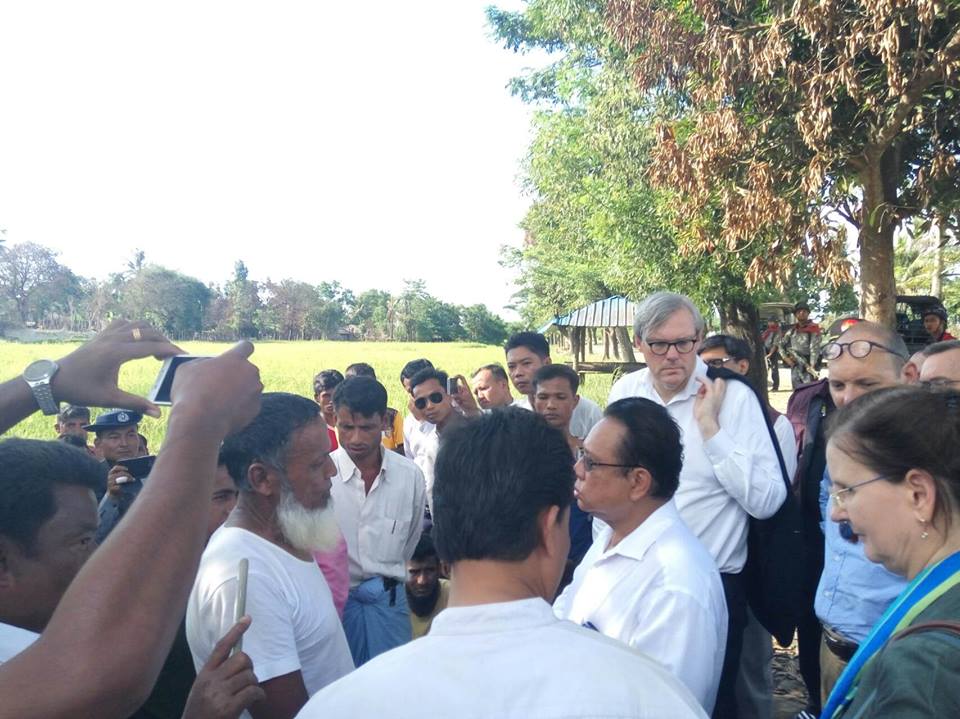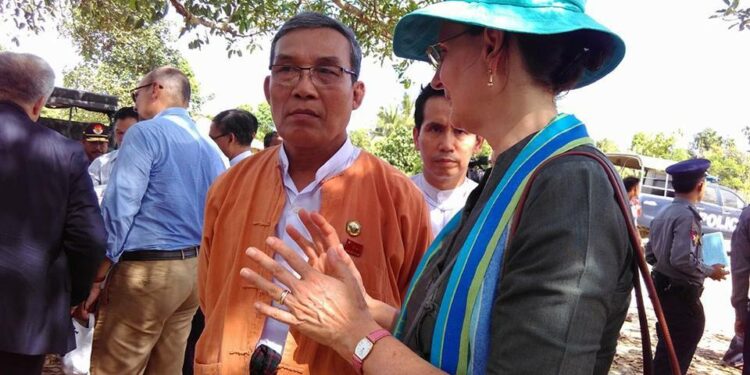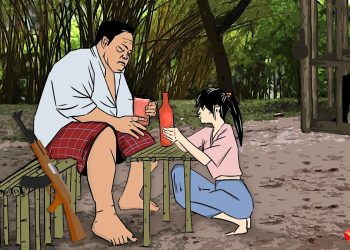RANGOON —The 10-member international delegation visiting northern Arakan State in relation to allegations of human rights abuses by the Burma Army was continuing its visits to villages in the area on Thursday, Nov. 3.
Five villages in Maungdaw and Buthidaung townships were due to be visited on the concluding day of the two-day trip, according to Arakan State government secretary U Tin Maung Swe.
The delegates’ observations at five villages on the first day of the visit did not square with allegations by human rights groups of arbitrary arrests, extrajudicial killings, looting, arson and rape of civilians carried out by the army, U Tin Maung Swe said.
Referring specifically to allegations of widespread burning of villages in the area, he said of the delegation, “now they know the reality.”
International human rights groups and diplomats requested access to the Muslim-majority area near the border with Bangladesh last week.
The region became the site of an ongoing security operation following Oct. 9 when three border guard police posts in Maungdaw and Rathedaung townships were attacked by an estimated 250 assailants, resulting in the deaths of nine police officers and the looting of dozens of firearms. The government has said the attacks were carried out by Islamist militants.

Allegations of human rights abuses committed during the security operation were quickly denied by the government, largely through President’s Office spokesperson U Zaw Htay, who attributed claims of abuse of civilians to “extremists” and “individuals and organizations that support terrorism.”
Access to the area has been severely restricted for humanitarian agencies and independent media, but this week Burma’s foreign affairs ministry allowed the international delegation—including US ambassador Scot Marciel, British ambassador Andrew Patrick, EU ambassador Roland Kobia, Chinese ambassador Hong Liang, and UN Resident and Humanitarian Coordinator Renata Dessallien—to embark on a carefully managed visit led by state officials.
Only government-controlled media were allowed to accompany the delegates.
Arakan State Chief Minister U Nyi Pu and the state Security and Border Affairs Minister Col. Htein Lin arranged on Wednesday for a helicopter to take the delegation from the Arakan State capital Sittwe, where they had arrived by plane from Rangoon, north to Maungdaw Township.
The delegation visited Kyee Kan Pyin, Nga Khura, Nga Sa Kyu, Kyein Chaung, and Pyaung Pike villages, all of which allegedly sustained heavy damage during the Burma Army’s search for the outpost attackers, said U Tin Maung Swe.
He claimed that the delegates were able to meet freely with Muslim residents, and he hoped that the delegation members would take the testimonies of villagers into account as they continue to investigate the recent attacks.

The Irrawaddy asked U Tin Maung Swe if his office had received any remarks from the group after returning from Maungdaw to Sittwe on Wednesday evening.
“Right now we haven’t received any comments [from the delegation]. I suppose they will release a statement very soon, maybe a joint statement once the visit is over,” he said.
The Irrawaddy was unable to reach United Nations Resident and Humanitarian Coordinator Renata Dessallien for comment on Wednesday.
US State Department spokesman John Kirby said in a press conference in Washington that the visit “was an initial step in what we hope will be a continued assessment of the situation in the area by the government and by the international community,” Reuters reported on Thursday.
The US ambassador Scot Marciel had taken “the opportunity to stress to government officials accompanying the delegation that a thorough investigation into allegations of abuse, protection of all residents, restoration of full humanitarian access are necessary,” Kirby told the regular news briefing.
A Burmese reporter accompanying the delegation—who has been following coverage of the upheaval in Maungdaw and who asked to remain anonymous—said that it was unclear during the visit yesterday whether damage to property, including the burning of houses in at least three villages identified by Human Rights Watch via satellite imagery, was carried out by assailants or by authorities.
Meanwhile U Tha Aye, a Muslim from Arakan State who currently lives in Rangoon, told The Irrawaddy on Wednesday that he had been informed by residents near Kyee Kan Pyi village that authorities took at least 100 people in for questioning after villagers spoke with the international delegation. He was unable to say whether they had been formally arrested.
Other reporters in the area said that three suspects in the village were detained by police but were released the same day.
One of those released told The Irrawaddy by phone on Thursday morning that he was now in hiding because of fears for his safety.
The Irrawaddy sought to phone various sources in the village but was unable to confirm the information on detentions. U Tha Aye said that this could be attributed, at least in part to villagers being “afraid to talk with media.”
Maungdaw resident U Than Soe Naing echoed reports that border police searched Kyee Kan Pyi after the delegation left, but this was denied by a police officer in the village, U Tun Zaw Oo during a phone conversation with The Irrawaddy.
“How would it be possible to arrest 100 people in such a short amount of time?” he said.
In a meeting at Sittwe airport on Wednesday, U Nyi Pu reiterated State Counselor Daw Aung San Suu Kyi’s commitment to humanitarian principles as security operations in Maungdaw continue.
The delegates are due to visit Ahlay Than Kyaw, Kaigyee, and Zaw Ma Tet villages in Maungdaw Township and Koe Tan Kaut village in Rathedaung Township today.
Meanwhile, police in northern Arakan State are pressing ahead with a plan to train and arm a new corps of “regional police,” to be recruited among local Buddhist Arakanese and non-Muslim minority groups and deployed only in their home areas.

















